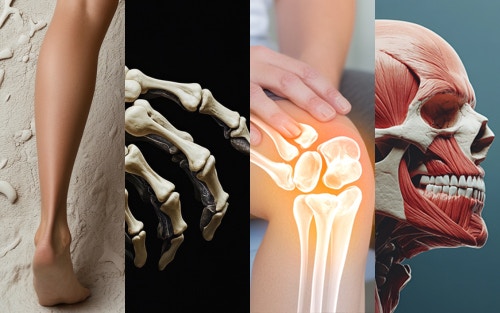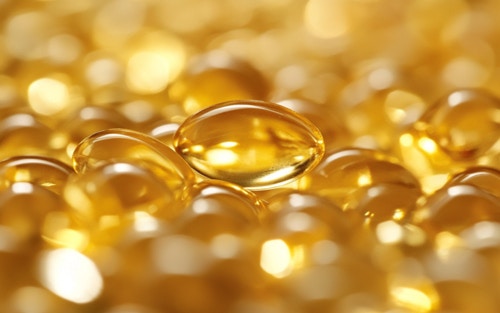Collagen is a protein that gives structure to skin, bones, and tendons. It makes up 30% of the body’s protein and is vital for skin health and joint function. But what is collagen, and how does it contribute to our overall well-being? This yourfootpalace.com article explores collagen’s roles and benefits.

Key Takeaways
- Collagen is the most abundant protein in the body, crucial for providing structure and support to skin, cartilage, bones, and other connective tissues.
- Collagen production decreases with age and is affected by lifestyle factors such as diet, sun exposure, and smoking, making it important to adopt healthy habits to maintain levels.
- Collagen supplements, particularly hydrolyzed forms, can enhance skin health and joint function, but individuals should be cautious of sourcing and potential allergens.
Understanding Collagen
Collagen is the most abundant protein in the body, making up almost 1/3 of the total protein content. It’s a key component of connective tissue, skin, tendon, bone, and cartilage, providing structure, strength, and support to these vital parts. Collagen supports firmness, plumpness, and elasticity, contributing to the overall health and appearance of the skin and other tissues. With its unique ability to provide tensile strength, collagen is fundamental to maintaining the integrity and function of various structures within the body.
To truly appreciate collagen’s importance, understanding its structure and its various types is crucial. These aspects play a significant role in how collagen functions and how we can support its production in our bodies. Exploring the intricate structure of collagen and its diverse types reveals its multiple roles.
The Structure of Collagen
Collagen’s remarkable structure consists of a triple helix formed by three intertwined polypeptide strands. Each strand adopts a left-handed helical structure, intertwining to form a right-handed triple helix. This unique formation is key to collagen’s strength and stability, providing tensile strength to various tissues.
Amino acids, particularly amino acids glycine, proline, and hydroxyproline, are the primary components crucial for collagen formation. These amino acids are arranged in a precise sequence to create collagen fibrils that bundle into collagen fibers. This arrangement forms the extracellular matrix, which supports and connects tissues throughout the body.
Types of Collagen
Collagen is not a one-size-fits-all protein; it exists in several types, each serving distinct biological functions. The main types of collagen are classified into fibrillar, network-forming, and fibril-associated collagens. Collagen type I is the most prevalent, found in skin, tendon, and bone, providing significant strength and structure to these tissues.
Type II collagen, on the other hand, is primarily found in cartilage, playing a crucial role in joint health and flexibility. Understanding these types helps us appreciate how collagen supports various bodily functions and how different forms of collagen supplements can target specific needs.
Whether you’re looking to improve skin health or support joint function, knowing the types of collagen can guide you in choosing the right supplement.
Functions of Collagen in the Body

Collagen is a workhorse protein, constituting about a third of the total protein content in the human body. The primary role of this tissue is to provide structure and strength. Additionally, it offers support throughout the body. Beyond connective tissues, collagen is essential for the structure of blood vessels and organs. It also aids in cell signaling, facilitating communication between cells and promoting tissue repair.
The functions of collagen in the body are manifold, impacting everything from skin health to joint and bone support. Let’s explore how collagen contributes to skin health and elasticity, joint and bone support, and muscle tissue repair and maintenance.
Skin Health and Elasticity
Collagen is a key player in maintaining skin health and elasticity. It provides firmness and suppleness, contributing to the skin’s resilience. The presence of collagen in the skin’s extracellular matrix adds elasticity and supports the protective barrier that keeps the skin hydrated.
As we grow older, the collagen levels in our skin diminish, resulting in the appearance of wrinkles, dryness, and sagging.. This process is a natural part of aging; collagen supplementation can mitigate the decrease in collagen levels, which research indicates may enhance skin hydration and elasticity.
By promoting the growth of new skin cells, collagen helps maintain a youthful, plump appearance.
Joint and Bone Support
Collagen is vital for the maintenance of cartilage, which cushions joints and helps prevent damage. It provides significant structural support to cartilage, ensuring proper joint function and mobility. Collagen also plays a key role in maintaining bone strength and density, which is essential for overall skeletal health.
Studies suggest that long-term collagen supplementation may aid in increasing bone mineral density, particularly in postmenopausal women. For those suffering from osteoarthritis, collagen supplements could potentially alleviate symptoms such as joint stiffness and pain.
Muscle Tissue and Connective Tissues
Collagen is crucial for the repair of muscle tissues after injury. It provides the necessary support to connective tissues, ensuring that muscles heal properly and maintain their strength and flexibility.
This makes collagen an essential component for anyone looking to maintain or enhance their muscle health.
Factors Affecting Collagen Production

The body produces collagen by turning protein from food into amino acids, which are then used to synthesize collagen molecules. However, several factors can affect this natural collagen production. Aging, sun exposure, smoking, excess alcohol, lack of sleep, and lack of exercise are all known to decrease collagen production.
Maintaining a balanced diet rich in protein, vitamin C, D, and zinc supports collagen levels as you age. Certain lifestyle habits, such as regular exercise and adequate sleep, can also help protect against collagen loss.
Examining how aging and lifestyle factors impact collagen production provides deeper insight.
Aging and Collagen Decline
Collagen levels naturally decline with age, typically starting after the age of 60. As we grow older, collagen in the skin becomes less organized, leading to decreased firmness and thickness. Oxidative stress and advanced glycation end-products (AGEs) contribute to collagen breakdown, making it stiff and rigid, which is a concern for those dealing with aging skin.
Hormonal changes, particularly lower estrogen levels after menopause, significantly reduce natural collagen production. These changes result in wrinkles, sagging skin, and reduced joint flexibility, underscoring the need to support collagen production as we age.
Lifestyle and Environmental Factors
Natural collagen production diminishes significantly due to factors like:
- Excessive sun exposure, which is identified as the primary contributor to collagen degradation
- Smoking
- Pollution
- Poor diet
- Lack of sleep
These lifestyle factors can also damage collagen.
Avoiding damaging lifestyle habits is essential to reduce the risk of collagen damage. Daily precautions such as wearing sufficient sunscreen, a wide-brimmed hat, UV-protective sunglasses, and long-sleeved clothing can protect skin collagen.
A healthy diet, limited sun exposure, and a consistent skincare routine are also crucial for supporting natural collagen levels for healthy skin.
Boosting Collagen Naturally

Natural collagen production supports skin elasticity, hydration, and overall health. Incorporating a variety of high-protein foods and vitamin-rich fruits and vegetables can enhance the body’s collagen production. Regular exercise and hydration also play a significant role in maintaining collagen levels.
Exploring the nutrients that support collagen production and collagen-rich foods can help you naturally boost collagen levels.
Nutrients That Support Collagen Production
Certain vitamins and minerals are essential for collagen synthesis. Vitamin C, zinc, copper, and manganese play critical roles in the collagen formation process. Proline and glycine are also important amino acids necessary for collagen production.
Egg whites, for instance, are a good source of proline, an amino acid crucial for the body’s collagen production. Including these nutrients in your diet supports healthy collagen production, maintaining the integrity of your skin, joints, and bones.
Foods Rich in Collagen and Amino Acids
High-protein foods, such as bone broth, are recommended for supporting collagen production. Citrus fruits and foods like pork skin provide nutrients that support collagen synthesis. Collagen-rich foods are broken down into amino acids upon digestion, which the body then uses to produce collagen.
Incorporating these foods into your diet can naturally boost collagen production, supporting overall health and vitality.
Collagen Supplements

Collagen supplements have become increasingly popular as a convenient way to support collagen production. Most collagen supplements are derived from animal sources, including hydrolyzed collagen, which is a common type used in supplements. These supplements can be consumed in various forms, including powders, capsules, and liquids.
Collagen peptides, which are broken-down forms of collagen, are easily absorbed through the gastrointestinal tract, making them an effective option for supplementation. Marine collagen, derived from fish, is particularly noted for its benefits to skin elasticity.
Examining the benefits and safety of collagen supplements provides useful insights.
Benefits of Collagen Supplements
Collagen supplements can enhance skin and skeletal health. They may reduce symptoms of osteoarthritis, improve skin hydration elasticity, and reduce wrinkles. Collagen peptides may also relieve pain and improve joint function in individuals with knee osteoarthritis.
For postmenopausal individuals with low bone mineral density, collagen supplementation can be particularly beneficial. Many collagen supplements also contain additional nutrients such as Vitamin C, biotin, and zinc, enhancing their overall effectiveness.
Safety and Side Effects
Collagen supplements generally have a favorable safety profile with minimal reported side effects. However, concerns have been raised regarding the presence of heavy metals in some supplements, and the FDA does not review supplements for safety.
Individuals with allergies to fish or shellfish should choose collagen supplements carefully to avoid adverse reactions.
Collagen Summary
Collagen is undeniably a cornerstone of our body’s structure and function. From skin health and joint support to muscle repair, its importance cannot be overstated. Understanding the factors that affect collagen production and how to boost collagen production empowers us to maintain our health, wellness, and vitality as we age.
Whether through diet, lifestyle changes, or supplements, supporting collagen production is a proactive step towards a healthier, more resilient body. Embrace the power of collagen and let it be your ally in the journey towards optimal health.
Frequently Asked Questions
What is collagen, and why is it important?
Collagen is the body’s most abundant protein, crucial for maintaining the structure and strength of connective tissues, skin, and bones. Its importance lies in its role in promoting overall health and tissue integrity.
How does aging affect collagen production?
Aging affects collagen production significantly, resulting in lower levels that diminish skin firmness and joint flexibility. This decline contributes to common signs of aging, such as wrinkles and reduced mobility.
What are some natural ways to boost collagen production?
To naturally boost collagen production, include high-protein foods and vitamin-rich fruits and vegetables in your diet while maintaining a healthy lifestyle. These changes can effectively enhance your body’s collagen levels.
Are collagen supplements safe to use?
Collagen supplements are generally safe, with minimal side effects, provided you select high-quality products to minimize contamination risks.
What are the benefits of taking collagen supplements?
Taking collagen supplements can enhance skin hydration and elasticity while also supporting joint health and increasing bone mineral density, which is particularly beneficial for postmenopausal women.